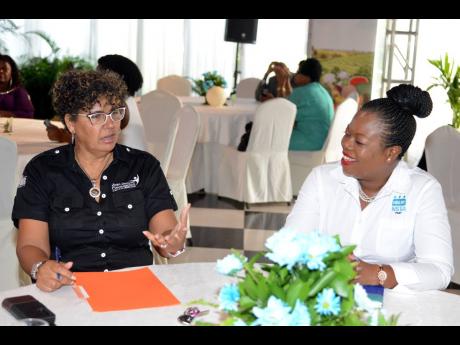Stop the violence against girls!
KEYNOTE SPEAKER at last Wednesday’s ‘Women in Agriculture’ conference at the Terra Nova All-Suite Hotel in St Andrew, Patricia Duncan Sutherland, closed out the programme with a jarring reminder of the violence too many women and girls in Jamaica face daily. Raped, beaten and subjected to a life of servitude with little or no help from the justice system; that is their reality, according to the chairman of the JMMB and Joan Duncan Foundation, who declared that it needs to stop.
Twenty woman who have worked as teachers/trainers in the agricultural sector were fêted and presented with awards and a framed black and white photo of a Jamaican landscape, before Duncan Sutherland came to the microphone. She admitted to wrestling with whether or not it would be an appropriate subject, especially given the day’s theme ‘From Boots to Heels’. However, the fact that only a mere 30 per cent of the women in Jamaican who suffer domestic violence report it helped her decision.
“I thought about whether I should bring this up today, because today is a celebration day and then I contextualised it. It’s better to be aware of this problem, better to choose to have the ability to solve this problem, so that women who are being celebrated and who are stronger in our society can lift up those in our society who are not,” the banker shared with her audience.
Describing violence against women in Jamaica as an epidemic, Duncan Sutherland noted that the Ministry of Culture, Gender, Entertainment and Sport through its Bureau of Gender Affairs has been doing a lot of work to address and mitigate the issue. She also referenced the work being done by the United Nations Development Programme’s Spotlight Initiative in Jamaica which is tacking the issue from three priority areas – child sexual abuse, intimate partner violence and discrimination against vulnerable groups.
However, despite these efforts as well the establishment of Domestic Violence Intervention centres in police stations across the island, which is a part of the Spotlight Initiatives, things are not happening fast enough and too many girls and women are still getting trapped in this vicious cycle, according to Duncan Sutherland.
She went on to read an excerpt from an article in the Journal of International Women’s Studies Volume 18 Issue 4, ‘Farming Cooperatives: Opportunities and Challenges for Women Farmers in Jamaica’ which was co-authored by professors Amani Ishemo and Brenda Bushell and published in August 2017 by the Bridgewater State University in Massachusetts, USA.
“These notable achievements by women cannot conceal the other side of gender-related problems in the Jamaican society. In spite of the increase in women’s educational attainment, they are still excluded from many upper management positions and there are high rates of domestic violence and rape, beginning with young girls at home molested by male relatives (Samms and Cholewa, 2010). Furthermore, many cases, particularly in the rural areas, go unreported or are never brought to court. We cite this excerpt from Haniff (1998, p. 52) based on her interview with one of the victims from rural Jamaica:
“This man who live in the area where me live, him see me live by myself and him feel now that him can stay there with me. Him a come help me with the pig and goat. Me tell him me don’t need any help and him a come any way. After me see him a come regular, me say to him. Look here, if you want to help with the work you can go ahead but me don’t want it and me not interested in you so you na fi feel that if you do work here you a go live with me. One day him come inside me house and him a hold on me and make himself forward. Me say no, and me push him way and him hold me down and rape me. Me fight him, but him strong and him box me in me face and kick me. Me cry and me go to police and dem take statement and him hear that me carry report on him. Him come back to my house and raped me again. Me go to the police, and them start to search for him, but him site them. Him come to my house again and burn it down and threaten to kill me. After that me get abortion because him get me pregnant. Me have to hide in a lot of places because me have no home.”
The fact that even though battered and bruised, on each occasion the woman reported the matter to the police, which resulted in her molester stepping up his violence against his victim, was not lost on Duncan Sutherland.
“Even after reporting it, where is the protection? So we have to work out how to support the police more and ... we need to make our justice system work so that it is possible that when a domestic violence case is brought before the courts, it can be dealt with quickly. Domestic violence and the way that we treat our women doesn’t just come because all of our men are bad. It comes because we have been taught that this is normal and this is acceptable.”
For these reason there needs to be a well-thought-out public awareness campaign, starting in our schools, Duncan Sutherland suggested, and especially directed at boys.
“We need to get into our schools. We must not be afraid to talk about it to our children; not to pretend that it doesn’t exist but that this is wrong. You do not have to accept this, you do not have to choose this way as a man.”

